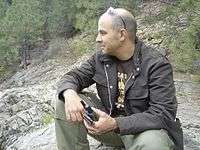Eric Paulos
| Eric Paulos | |
|---|---|
 | |
| Born |
1969 (age 46–47) Los Angeles |
| Nationality | American |
| Occupation | Professor |
| Known for | computer science research, art, robotics research |
| Website |
paulos |
Eric Paulos is an American computer scientist, artist (working in new media art), and inventor, best known for his early work on internet robotic teleoperation and is considered a founder of the field of Urban Computing. His current work is in the area of citizen science, energy materiality, DIY Biology, DIY culture, Micro-volunteering, and the cultural critique of such technologies through New Media strategies.
Dr. Paulos is the Director of the Living Environments Lab and an Associate Professor in the Berkeley Center for New Media (BCNM) with a faculty appointment within the Electrical Engineering Computer Science Department at UC Berkeley. Previously, Eric held the Cooper-Siegel Associate Professor Chair in the School of Computer Science at Carnegie Mellon University where he was faculty within the Human-Computer Interaction Institute with courtesy faculty appointments in the Robotics Institute and in the Entertainment Technology Center. Prior to CMU, Eric was Senior Research Scientist at Intel Research at one of the Intel Research Lablets in Berkeley, California where he founded the Urban Atmospheres research group - challenged to employ innovative methods to explore urban life and the future fabric of emerging technologies across public urban landscapes. His areas of expertise span a deep body of research territory in urban computing, sustainability, green design, environmental awareness, social telepresence, robotics, physical computing, interaction design, persuasive technologies, and intimate media. Eric is a leading figure in the field of urban computing, coining the term in 2004, and a regular contributor, editorial board member, and reviewer for numerous professional journals and conferences. His published work is primarily in the areas of Robotics, Urban Computing, Human-Computer Interaction, Computer supported cooperative work, and Ubicomp. He received his PhD in Electrical Engineering and Computer Science from UC Berkeley where he helped launch a new robotic industry by developing some of the first internet tele-operated robots including Space Browsing helium filled blimps and Personal Roving Presence devices (PRoPs).
Eric is also the founder and director of the Experimental Interaction Unit and a frequent collaborator with Mark Pauline of Survival Research Laboratories. Eric's work has been exhibited at the InterCommunication Center (ICC) in Japan, Ars Electronica, ISEA, SIGGRAPH, the Dutch Electronic Art Festival (DEAF), SFMOMA, the Chelsea Art Museum, Art Interactive, LA MOCA, Yerba Buena Center for the Arts, the ZKM, Southern Exposure, and a performance for the opening of the Whitney Museum’s 1997 Biennial Exhibition.
Born and raised in California, Eric received a B.S., M.S., and Ph.D. in Electrical Engineering and Computer Science from the University of California, Berkeley, completing his Ph.D. in 2001. Eric has also collaborated with Mark Pauline of Survival Research Laboratories since 1994.
In September 2008, Eric joined the faculty at Carnegie Mellon University's Human-Computer Interaction Institute where he founded a new lab, the Living Environments Lab, to explore environmental issues and sustainability scoped within HCI and Ubicomp research.
In August 2012, Eric joined the faculty at UC Berkeley in the Berkeley Center for New Media and Electrical Engineering and Computer Science.
Selected bibliography
- Paulos, E. and Canny J. 1998. PRoP: Personal Roving Presence. ACM SIGCHI, 296 - 303.
- Paulos, E. and Canny J. 2000. Personal Tele-embodiment: Reconstructing the Body for Online Interaction in The Robot in the Garden: Telerobotics and Telepistemonogy on the Internet, Cambridge: MIT Press.
- Paulos, E. and Canny J. 2001. Social Tele-embodiment: Understanding Presence. Autonomous Robots, 11(1), 87-95.
- Paulos, E. and Goodman, E. 2004. The Familiar Stranger: Anxiety, Comfort, and Play in Public Places. ACM SIGCHI, 223-230.
External links
- Eric's personal home page
- Lecture during Mobile Art && Code series at Carnegie Mellon University
- Living Environments Lab
- Urban Atmospheres
- Carnegie Mellon University
- Human-Computer Interaction Institute